- Home
- Robert Bryndza
The Night Stalker: A chilling serial killer thriller (Detective Erika Foster Book 2) Page 2
The Night Stalker: A chilling serial killer thriller (Detective Erika Foster Book 2) Read online
Page 2
What’s going on? You could have warned me! Why didn’t you tell me your idiot ex-boyfriend would be here? Are you insane to let him back into your life after what he did to you?
She’d wanted to shout when she’d come through to the kitchen, and had seen Stephen sitting languidly in shorts and a T-shirt. But she’d felt awkward, and polite British convention dictated that they all gloss over it, and pretend things were normal.
‘Would anyone like coffee?’ asked Isaac, closing the dishwasher and turning to face them. He was a tall, handsome man, with a head of thick dark hair swept back from a high forehead. His large brown eyes were framed by thinly shaped eyebrows, which could be arched or drawn together to communicate all manner of wry emotions. Tonight, however, he just looked embarrassed.
Stephen swirled the white wine in his glass and looked between Erika and Isaac. ‘Coffee already? It’s barely eight o’clock, Isaac, and it’s bloody hot. Open more wine.’
‘No, coffee would be great, thank you,’ said Erika.
‘If you must have coffee, at least use the machine,’ said Stephen. He added, territorially, ‘Did he tell you? I bought him the Nespresso. Cost a fortune. From my last book advance.’
Erika smiled blandly and took a roasted almond from a dish in the centre of the table. As she chewed, it seemed to crackle through the silence. During the awkward meal, Stephen had done most of the talking, telling them in great detail about the new crime novel he was writing. He’d also taken it upon himself to tell them all about forensic profiling, which Erika had thought was a bit rich, considering that Isaac was one of the leading forensic pathologists in the country, and that Erika herself, as a detective chief inspector with the London Metropolitan Police, had successfully solved a string of murder cases in the real world.
Isaac started to make coffee and switched on the radio. ‘Like a Prayer’ by Madonna cut through the silence.
‘Turn it up! I love a bit of Madge,’ said Stephen.
‘Let’s have something a bit more mellow,’ said Isaac, scrolling through the radio stations until the sweet mournful strings of a violin replaced Madonna’s squeaky voice.
‘Allegedly, he’s a gay man,’ said Stephen, rolling his eyes.
‘I just think something more mellow would suit right now, Stevie,’ said Isaac.
‘Christ. We’re not eighty! Let’s have some fun. What do you want to do, Erika? What do you do for fun?’
Stephen, to Erika’s eyes, was a host of contradictions. He dressed very straight, like an American Ivy League athlete, but his movements had a camp lightness to them. He crossed his legs now and pursed his lips, waiting for her answer.
‘I think… I’m going to go and have a cigarette,’ she said, reaching for her bag.
‘The door’s unlocked upstairs,’ said Isaac, looking at her with apologetic eyes. She pulled her face into a smile and left the kitchen.
Isaac lived in a townhouse in Blackheath, near Greenwich. The spare bedroom upstairs had a small balcony. Erika opened the glass door, went outside and lit up a cigarette. She exhaled smoke into the dark sky, feeling the intensity of the evening heat. The summer night was clear, but the stars were faint against the haze of light pollution floating up from the city stretching out in front of her. She followed the path of the laser from the Greenwich Observatory, craning her head to where it vanished amongst the stars high above. She took another deep drag on her cigarette and heard the crickets singing in the dark back garden below, mixed in with the hum of traffic from the busy road behind.
Was she being too harsh in her assessment of Isaac allowing Stephen back into his life? Was it just that she was jealous that her single friend was no longer single? No – she wanted the best for Isaac, and Stephen Linley was a toxic individual. She reflected, sadly, that there might not be room in Isaac’s life for both herself and Stephen.
She thought of the small, sparsely furnished flat she struggled to call home, and of the lonely nights she spent in bed staring into the darkness. Erika and Mark had shared their lives in more ways than just as man and wife. They had been colleagues, joining the Greater Manchester Police in their early twenties. Erika had been a rising star in the force and was rapidly promoted to detective chief inspector, senior in rank to Mark. Mark had loved her all the more for it.
Then, almost two years previously, Erika had led the disastrous drug raid that had resulted in the death of Mark and four of their colleagues. Afterwards, the grief and burden of guilt had at times seemed too great to bear, and she had struggled to find her place in the world without her husband. A fresh start in London had been tough, but her work in the Homicide and Serious Crime Command within the Metropolitan Police was the one thing she had been able to pour her energy into. But where she had once been a rising star in the force, now she was tainted, and her career progression had ground to a halt. She was direct, driven and a brilliant officer who didn’t suffer fools – but she had no time for the politics of the force, and she had clashed repeatedly with her superiors, making some powerful enemies.
Erika lit another cigarette, and she was just deciding she would make an excuse to leave quickly when the glass door opened behind her. Isaac poked his head round and came onto the balcony.
‘I could use one of those,’ he said, closing the door and moving over to where she stood by the iron railing. She smiled and offered him the packet. He teased one out with a large, elegant hand and leaned over as she lit it for him.
‘Sorry, I really screwed up tonight,’ he said, straightening up and exhaling smoke.
‘It’s your life,’ said Erika. ‘But you could have given me a heads-up.’
‘It all happened so quickly. He showed up this morning on the doorstep and all day we’ve been talking and… I won’t spell it out. It was too late to cancel, not that I wanted to cancel.’
Erika could see the angst playing over his face. ‘Isaac, you don’t need to explain yourself to me. Although, if I were you, I’d pick lust as your explanation. You were overcome by lust. It’s much more forgivable.’
‘I know he’s a complicated individual, but he’s different when we’re alone together. He’s vulnerable. Do you think if I approached it in the right way, if I set proper boundaries, it could work this time?’
‘Possibly… And at least he can’t kill you off again,’ said Erika wryly.
Stephen had based a forensic pathologist in one of his novels on Isaac, only to kill the character off in a rather graphic gay bashing.
‘I’m serious. What do you think I should do?’ asked Isaac, his eyes filled with angst.
Erika sighed and took his hand in hers. ‘You don’t want to hear what I think. I like being friends with you.’
‘I value your opinion, Erika. Please, tell me what I should do…’
There was a creak as the glass door opened. Stephen emerged barefoot, carrying a full tumbler of whisky and ice. ‘Tell him what he should do? About what?’ he asked tartly.
The awkward silence was broken by a message alert tone chiming from the depths of Erika’s bag. She pulled out her phone and read the message, frowning.
‘Everything okay?’ asked Isaac.
‘The body of a white male has been discovered in a house in Laurel Road, Honor Oak Park. Looks suspicious,’ said Erika, adding, ‘Shit, I haven’t got my car. I took a cab here.’
‘You’ll need to assign a forensic pathologist. I could take you in my car?’ said Isaac.
‘I thought you had the night off?’ Stephen demanded, indignantly.
‘I’m always on duty, Stevie,’ replied Isaac, looking eager to leave.
‘Okay, then, let’s go,’ said Erika, and couldn’t resist adding to Stephen, ‘looks like coffee from your machine will have to wait.’
4
Erika and Isaac arrived at Laurel Road half an hour later, their awkward dinner party rapidly forgotten. Police tape closed off the road in both directions and support vehicles added to the cordon: a police van, four squad cars and an amb
ulance. The vehicles’ blue lights pulsed across the long row of terraced houses. In several of the front windows and doorways, neighbours stood gawking at the scene.
Detective Inspector Moss, one of Erika’s most trusted colleagues, walked over to meet their car as it pulled into a space a hundred yards down from the police cordon. She was a short, solid woman and was sweating profusely in the heat, despite her knee-length skirt and thin blouse. Her red hair was pulled back from her face, which was awash with freckles – a small group of them clustered under her eye, forming what looked like a tear. However, in contrast to this, she was upbeat, and gave Erika and Isaac a wry grin as they got out of the car.
‘Evening, boss, Dr Strong.’
‘Evening, Moss,’ said Isaac.
‘Evening. Who are all these people?’ Erika asked, as they approached the police tape, where a group of tired-looking men and women stood staring at the scene.
‘Commuters from Central London, arriving home to find their street is a crime scene,’ said Moss.
‘But I live just there,’ one man was saying, pointing with his briefcase to a house two doors down. His face was flushed and weary, his thinning hair plastered to his head. When Moss, Erika and Isaac drew level with him at the police tape, he looked to them, hoping they had come to give different news.
‘I’m DCI Foster, the senior investigating officer, and this is Dr Strong, our forensic pathologist,’ said Erika flashing her ID at the uniformed officer. ‘Get in contact with the council, organise these people beds for the night.’
‘Very good, ma’am,’ said the uniformed officer, signing them all in. They ducked under the police tape before they could get involved with the commuters protesting at the thought of a night on camp beds.
The front door of 14 Laurel Road was wide open, and lights blazed from the hallway, which was busy with CSIs wearing dark blue overalls and face masks. Erika, Isaac and Moss were handed overalls, and they suited up on a patch of shingle in the tiny front garden.
‘The body’s upstairs, front bedroom,’ said Moss. ‘Victim’s mother came over to feed the cat. Thought he was away on holiday in the south of France but, as you’ll see, he never made it to the airport.’
‘Where is the mother now?’ asked Erika, stepping into the thin overalls.
‘She was overcome by the shock and heat. Uniform just went with her to University Hospital, Lewisham. We’ll need to get a statement when she’s recovered,’ said Moss, zipping up her own suit.
‘Just give me a few minutes to examine the scene,’ said Isaac, as he pulled up the hood of his own suit. Erika nodded, and he went off into the house.
The heat, volume of people and bright lights all helped to tip the temperature in the upstairs bedroom to over forty degrees centigrade. Isaac, with his team of three assistants and the crime scene photographer, worked in an efficient, respectful silence.
The victim lay naked on his back in the double bed. He had a tall, athletic frame. His arms were pulled up and outwards and tied to the headboard with thin twine, which was biting into the flesh of his wrists. His legs were splayed, feet apart. A clear plastic bag was moulded to his head, the features distorted underneath.
Erika always found naked corpses much more difficult to deal with. Death was undignified enough, without being exposed in this way. She resisted the urge to place the sheet over his lower body.
‘The victim is Dr Gregory Munro, forty-six years old,’ said Moss, as they stood around the bed. His brown eyes were wide open and surprisingly clear beneath the plastic, but his tongue was beginning to swell and poke through his teeth.
‘Doctor of what?’ asked Erika.
‘He’s the local GP. Owns and manages the Hilltop Medical Practice on Crofton Park Road,’ replied Moss. Erika looked over at Isaac, who was standing on the opposite side of the bed, examining the body.
‘Can you give me a cause of death?’ asked Erika. ‘I’m assuming asphyxiation, but…’
Isaac released the victim’s head, the chin coming to rest on the bare chest. ‘The evidence points to asphyxiation, but I’ll need to determine that the bag wasn’t placed over his head post-mortem.’
‘A sex game gone wrong? Autoasphyxiation?’ asked Moss.
‘Hypothetically, yes. But we can’t rule out foul play.’
‘Time of death?’ asked Erika, hopefully. She was now sweating profusely under her crime scene overalls.
‘Don’t push it,’ said Isaac. ‘I won’t be able to give you a time of death until I’ve had a closer look and opened him up. Extreme heat or cold slows putrefaction: in the case of the heat in this room, it’s drying out the body. You can see the flesh has started to discolour.’ He pointed to where the skin was blooming in shades of green around the abdomen. ‘This could indicate he has been here for a few days, but, as I say, I’ll need to perform the post-mortem.’
Erika cast her eye around the room. A long wardrobe of heavy wood lined the wall next to the door, and in the nook of the bay window there was a matching dresser with a mirror. To the left of the window was a tall set of drawers. Every surface was clear: there were no books or ornaments, or any of the general detritus that accumulates in a bedroom. It was very neat. Almost too neat.
‘Was he married?’ asked Erika.
‘Yes. The wife is no longer on the scene. They’ve been separated for a few months,’ said Moss.
‘It’s very tidy, for a newly single man,’ said Erika. ‘Unless the attacker cleaned up,’ she added.
‘What? Had a vacuum round before he scarpered?’ asked Moss. ‘I wish he’d pay me a visit. You should see my place.’
Despite the heat, Erika saw a couple of the crime scene officers working around the body hide their smiles.
‘Moss, not the right time.’
‘Sorry, boss.’
‘I think the arms were tied post-mortem,’ said Isaac, gently indicating the wrist area with his latex-gloved finger. The skin around the armpits was stretched in white lines against the shades of waxy skin underneath. ‘There’s very little abrasion on the wrists.’
‘So he was already in bed when the attack happened?’ asked Erika.
‘Possibly,’ replied Isaac.
‘There’s no discarded clothes. He could have undressed normally for bed and tidied them away,’ said Moss.
‘So someone could have been hiding under the bed or in the wardrobe, or could have come through the window?’ asked Erika, blinking as sweat ran down her forehead into her eyes.
‘That’s for you to find out,’ said Isaac.
‘Yes, it is. Lucky me,’ replied Erika.
Erika and Moss came downstairs to the open-plan living area, where a team of crime scene technicians was working on the rest of the house. One of the technicians approached them. Erika hadn’t met him before. He was in his early thirties, with a handsome face and a high Nordic forehead. Sweat glistened through his blond hair. When he reached Erika, he looked up, realising how tall she was at just over six foot.
‘DCI Foster? I’m Nils Åkerman, crime scene manager,’ he said. He had a slight Swedish accent under his perfect English.
‘You’re new?’ asked Moss.
‘To London? Yes. To murder and mayhem, no.’ Nils had a pleasant, handsome face and, like many people who dealt with death and horror on a daily basis, seemed respectfully detached, with a dark sense of humour.
‘Good to meet you,’ said Erika. Their latex gloves crackled as they shook hands.
‘What do you know already?’ he asked.
‘Take us through it from the top,’ said Erika.
‘Okay. So the mother shows up around seven-thirty to feed the cat. Lets herself in with a key. The power had been switched off at the mains when she arrived. And it looks as though it had been off for a few days. The contents of the fridge and freezer were decaying.’
Erika looked over to the large stainless steel fridge-freezer, where a couple of brightly coloured child’s finger paintings were attached with magnets.
/> ‘The Internet and phone connections had also been cut off,’ added Nils.
‘Cut off from not paying the bill?’ asked Erika.
‘No, the Internet cable itself was cut,’ said Nils, moving to the kitchen counter and holding up a plastic evidence bag containing two pieces of cable. One was connected to a small modem. He held up another bag. ‘This is the victim’s mobile phone. The SIM card and battery are missing.’
‘Where was it found?’ asked Erika.
‘On the bedside table. It was still plugged in and connected to the charger.’
‘There’s no other phone in the house?’
‘Just the landline downstairs.’
‘So, whoever did this took the SIM and battery out of the phone after it had been put on the bedside table to charge?’ said Moss.
Nils nodded. ‘It’s a possibility.’
‘Hang on, hang on,’ said Erika. ‘Was there anything else on the bedside table? The bedroom looks very bare.’
‘Apart from the phone, there was nothing else,’ said Nils. ‘We did, however, find these in the bedside table drawer.’ He held up another evidence bag containing four gay porn magazines: copies of Black Inches, Ebony and Latino Males.
‘He was gay?’ asked Erika.
‘And married,’ added Moss.
‘How old was he again?’
‘Forty-six,’ replied Moss. ‘He was separated from his wife. But these magazines are old. Look, they’re issues dated 2001. Why would he keep them here?’
‘So they were hidden, and he was secretly gay?’ asked Erika.
‘Maybe they’d been stashed away for years. Maybe he liberated them from the attic when his marriage broke down,’ said Nils.
’That’s too many maybe’s for my liking,’ said Erika.
‘We found the packaging for an individual microwave lasagna on the kitchen island. It was on a plate, and beside it was an empty wine glass and a half-full bottle of red wine. We’re about to send them off to the lab,’ said Nils. ‘You should also see this.’

 The Girl in the Ice: A gripping serial killer thriller
The Girl in the Ice: A gripping serial killer thriller Shadow Sands
Shadow Sands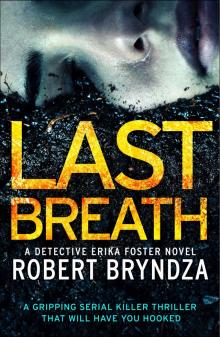 Erika Foster 04 - Last Breath
Erika Foster 04 - Last Breath A Very Coco Christmas
A Very Coco Christmas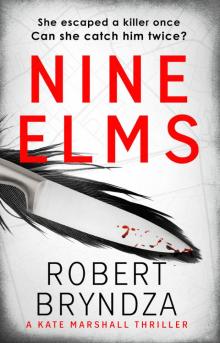 Nine Elms: The thrilling first book in a brand-new, electrifying crime series (Kate Marshall 1)
Nine Elms: The thrilling first book in a brand-new, electrifying crime series (Kate Marshall 1) Coco Pinchard, the Consequences of Love and Sex
Coco Pinchard, the Consequences of Love and Sex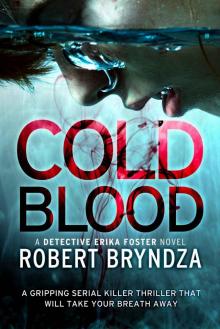 Cold Blood: A gripping serial killer thriller that will take your breath away
Cold Blood: A gripping serial killer thriller that will take your breath away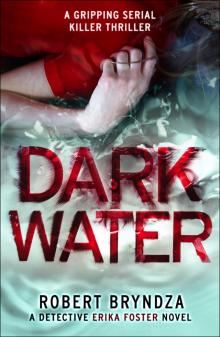 Dark Water: A gripping serial killer thriller
Dark Water: A gripping serial killer thriller The Girl in the Ice: A gripping serial killer thriller (Detective Erika Foster crime thriller novel Book 1)
The Girl in the Ice: A gripping serial killer thriller (Detective Erika Foster crime thriller novel Book 1)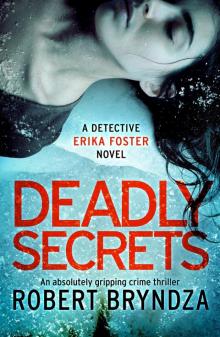 Deadly Secrets: An absolutely gripping crime thriller
Deadly Secrets: An absolutely gripping crime thriller Miss Wrong and Mr Right
Miss Wrong and Mr Right The Not So Secret Emails Of Coco Pinchard
The Not So Secret Emails Of Coco Pinchard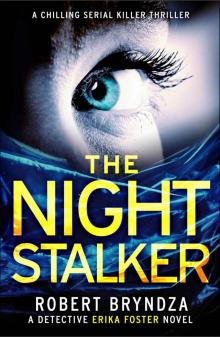 The Night Stalker: A chilling serial killer thriller (Detective Erika Foster Book 2)
The Night Stalker: A chilling serial killer thriller (Detective Erika Foster Book 2) Coco Pinchard's Must-Have Toy Story
Coco Pinchard's Must-Have Toy Story Coco Pinchard's Big Fat Tipsy Wedding: A Funny Feel-Good Romantic Comedy
Coco Pinchard's Big Fat Tipsy Wedding: A Funny Feel-Good Romantic Comedy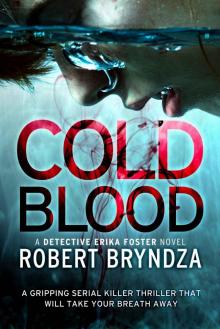 Cold Blood: A gripping serial killer thriller that will take your breath away (Detective Erika Foster Book 5)
Cold Blood: A gripping serial killer thriller that will take your breath away (Detective Erika Foster Book 5) The Coco Pinchard Boxset: 5 bestselling romantic comedies in one!
The Coco Pinchard Boxset: 5 bestselling romantic comedies in one! The Not So Secret Emails Of Coco Pinchard (A Romantic Comedy)
The Not So Secret Emails Of Coco Pinchard (A Romantic Comedy) Coco Pinchard, the Consequences of Love and Sex: A Funny, Feel-Good, Romantic Comedy
Coco Pinchard, the Consequences of Love and Sex: A Funny, Feel-Good, Romantic Comedy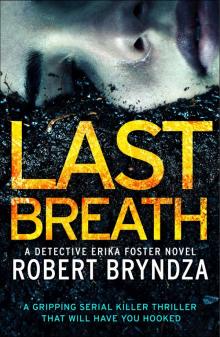 Last Breath
Last Breath